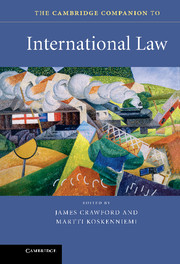Book contents
- Frontmatter
- Contents
- Preface
- Notes on contributors
- Introduction
- Part I The contexts of international law
- Part II International law and the state
- Part III Techniques and arenas
- 8 Law-making and sources
- 9 International courts
- 10 International institutions
- 11 International law and the relativities of enforcement
- Part IV Projects of international law
- Guide to electronic sources of international law
- International law chronology
- Select guide to further reading
- Index
- References
11 - International law and the relativities of enforcement
from Part III - Techniques and arenas
Published online by Cambridge University Press: 05 July 2015
- Frontmatter
- Contents
- Preface
- Notes on contributors
- Introduction
- Part I The contexts of international law
- Part II International law and the state
- Part III Techniques and arenas
- 8 Law-making and sources
- 9 International courts
- 10 International institutions
- 11 International law and the relativities of enforcement
- Part IV Projects of international law
- Guide to electronic sources of international law
- International law chronology
- Select guide to further reading
- Index
- References
Summary
Introduction
When the English philosopher John Austin delivered the six lectures he published as The Province of Jurisprudence Determined in 1832, he argued that there were laws properly so-called (commands that are ‘armed with sanctions, and impose duties, in the proper acceptation of the terms’ (Austin 1832 [1995], 119) and laws like international law that were laws improperly so-called, by virtue of an ‘analogical extension’ of terms such as ‘law’ and ‘rule’ (ibid., 123). Austin considered enforcement, or at least enforceability, an essential ingredient for the existence of law. Since international law presented no obvious or readily identifiable machineries for its enforcement, it had taken the name of ‘law’ in vain and it could hold no claim to this status. To similar effect, a popular Japanese song of the 1880s had it that ‘There is a Law of Nations, it is true,/but when the moment comes, remember,/the Strong Eat up the Weak’ (Sansom 1965, 407). International law had, however, historically considered the matter of its existence as separate from its enforcement: the former spoke to the validation and authority of this law as law; the latter to questions of its effectiveness. And this stands to reason: a law can only be enforced once we have been assured of its promulgation.
- Type
- Chapter
- Information
- The Cambridge Companion to International Law , pp. 245 - 268Publisher: Cambridge University PressPrint publication year: 2012
References
- 6
- Cited by

